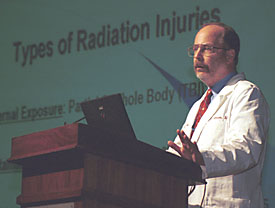 |
|
EMILY REID/Arizona Daily Wildcat
|
Professor of emergency medicine, Dr. Ken Iserson, speaks about the health community's level preparedness in the case of a radioactive or chemical terrorist attack to a group of medical personnel yesterday at the University Medical Center. Other speakers included weapons of mass destruction experts from the Federal Bureau of Investigation and the Los Alamos Testing Facility as well as a leading Tucson fire department authority.
|
|
By Kristina Dunham
Arizona Daily Wildcat
Wednesday August 28, 2002
University Medical Center healthcare personnel are trying to extend their knowledge and understanding of how to respond in the event of a terrorist attack, as the one-year anniversary of the Sept. 11 terrorist attacks approaches.
At a forum entitled "Medical Responses to Radiological Terrorism and Disasters," held yesterday at the UMC, speakers representing the UMC, Metropolitan Medical Response System (MMRS), and government agencies, including the FBI, provided information to medical providers on what to do in case of a radiological emergency.
Medical workers attending the forum were given simple steps to follow in the event of a radiological terrorist incident to prevent further contamination, such as removing a patient's clothing at the scene ÷ which removes up to 90 percent of contamination ÷ covering all instruments with plastic bags during decontamination, and keeping oneself clothed in the universal protection outfits that surgeons normally wear.
As the soon-to-be lone trauma center in Tucson, UMC medical staff is preparing for any possible medical emergencies, including radiological terrorist attacks.
Tucson Medical Center is closing its trauma unit in January due to budget shortages.
"As emergency room physicians, we are on the front lines of any potential type of terrorist attack, and it is important for us to identify any sign of terrorist activity," said Doug Smith, chief resident of the UMC emergency room,
UMC medical personnel practice emergency scenarios, including how to handle patients who have been exposed to radiation, every year, Smith said.
"Definitely since Sept. 11 there has been a shift in emphasis on biological agents and terrorism," he added.
Medical personnel were also advised to stay calm in the event of such an emergency to minimize public anxiety and prevent frightened patients from overwhelming the healthcare system.
Ken Iserson, a professor of emergency medicine and E.R. physician at UMC, further stressed that medical workers need to treat patients who have been exposed or contaminated either externally or internally without reservations.
No person who has withstood major radiation exposure and is still alive can cause life-threatening injuries to emergency responders, Iserson said.
Smith said he thinks university physicians are "really prepared" to handle an emergency radiological incident radioactive materials, especially since UA has a number of experts on staff who specialize in things from hazardous materials to radiation control.
Fran Bartholomeaux, a critical care educator and chair of the school preparedness committee, said that terrorism emergency preparedness is a part of the University Medical Center's mission, as well as part of the medical education a student receives at the university and school administration, as well.
According to one government agency official who spoke at the forum, the chances of a radiological terrorist act, in either the form of a radiation dispersion devices, aka a "dirty bomb,"; a nuclear weapon; or contamination of the food or water supply with radioactive or biological agents, are very unlikely to occur in Tucson, or in the rest of the nation.
Tucson Fire Department's battalion chief Les Caid said people are more likely to see a truck carrying chemical agents tip over than a terrorist attack in Tucson.
"It is important to educate ourselves so we can educate the public," Caid said, citing how an epidemic of fear was the main problem last fall when everyone was concerned about anthrax.
Five people died of anthrax poisoning last year; over 10,000 died of the flu in about the same amount of time, he said.

